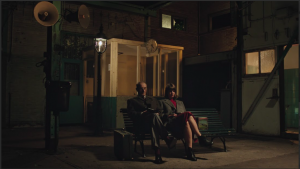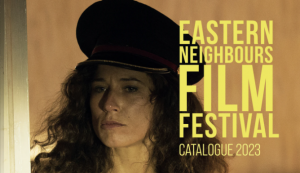
Danilo Serbedzija: Tereza37 Is a Story of an Atypical Heroine in a Male-Centric Society
Written by Tatjana Lisjak
One of the most notable and award-winning Croatian movies in the last two years is certainly Tereza37, a film that follows the life of an unfulfilled middle-aged woman, lonely in marriage, struggling with infertility, and the expectations of a patriarchal society. Visitors of the Eastern Neighbors Film Festival had the opportunity to see it last November at a special screening in Utrecht. The film will be shown again at the festival’s 13th edition in The Hague. On the eve of the screening, we spoke with director Danilo Serbedzija, who will also be one of the festival’s special guests.
Tereza37 is your third feature film and the first in which you did not collaborate as a screenwriter. This is a woman’s story told from a woman’s point of view, and it was written by Lana Baric, who is also the main actress in the film. How did you decide to join the project?
Yes, this is a woman’s story. Initially, Lana and producer Irena Markovic wanted to hire a female director, but it didn’t work out. My friend Ivana Roscic, who plays Tereza’s sister in the film, recommended me because she thought my approach suited their script. Honestly, I was thrilled after reading it for the first time and a bit jealous that I didn’t write it myself. I knew right away that was what I wanted.
Tereza is not a typical heroine. She is a person of inconspicuous appearance, semi-invisible, whom we might pass on the street without noticing. Her husband is often absent, and she is doomed to suffer defeats and numerous spontaneous abortions on her own. Does Tereza, or any woman, have the right to freedom in patriarchy, which is what she is trying to achieve in this film?
Lana is extremely intelligent and she wrote Tereza very well, as an imperfect character. It is not just a depiction of a poor and oppressed woman who is, at the same time, beautiful in all her misery and pain. Sometimes she turns out to be stupid and reckless. And that’s great, not to have a black and white categorization. Lana did not see Tereza as a sufferer who fights for her rights. Tereza may not even be aware that she is fighting for something, her actions may be selfish or the result of inner sadness. But the film shows we are not in the same position, men and women are not perceived equally. A banal example is a man who goes out every night and hangs out with girls. He’s a guy, he’s macho, society looks at it with approval. When a woman does that, then she’s a whore. That is the perception of most people. We are not equal, even if we do not dive into other, more complex things, from unequal wages, unequal working conditions, and a hundred problems that women have to go through. Society expects something from women, and that is family and children. If you don’t have those, you are seen as an unfulfilled person.
Speaking of her recklessness, Tereza indulges in promiscuity out of a desire to get pregnant. Eventually, she is raped by one of her suitors. Is that a “punishment” for being too free and a message that a woman has no right to go against the rules of patriarchy?
I don’t like to impose a message, nor does the film aim to deliver one. It is simply a fact of life, and we must fight against it. This inequality is visible in all fields. For example, just look at the film festivals: who make up the jury and the presidents of the jury? Rarely any woman! The statistics are devastating. It may sound harsh to some, but that’s how it is. Rape can be taken literally as “you know where you belong”, “you asked for it yourself”, “why did she unbutton her blouse” and other horrible excuses we hear. Some wondered if that rape scene was necessary, and others commented it was in there because a man directed it. Funny, because I didn’t write the script. It was written and played by a woman who is a fierce women’s rights activist. Frankly, I don’t think it’s too much. And the rapist? That man is lost, he is a total loser, a weak man who is dependent on his mother, even for buying his shoes. That is my favorite scene when Tereza runs into him in a shopping mall after the rape. We’ve been thinking for a long time about how to approach that. Lana came up with a great wordless shoe-buying scene where the looks on their faces say all. I like those scenes when the actors don’t say a word, but you can read everything from the expressions on their faces.
In this film, a lot lies in the camera and shooting angles. Much is unsaid and can be deduced from facial expressions, looks, and small gestures. You manage to capture the mentality of a small town and the complexity of relationships, especially among women and family members. You also received a lot of praise for the way you portrayed the city of Split. Here we do not see a tourist postcard of the largest Mediterranean city on the Croatian coast, but something else.
Before we started with the preparations, I knew we had to find a cameraman from Split. Mirko Pivcevic is an old friend of mine and I was happy when he agreed to join our crew. It was my wish to work with him for a long time but he was always occupied with other projects. The city’s urban part plays an important role in this movie. In my opinion, [neighborhoods] Trstenik and Split 3, have such beautiful and cinematic architecture. This is not the Split everyone knows from touristic brochures; we deliberately avoided showing beaches and sea before the end scene when we’re opening the view to the islands. We intended to convey Tereza’s inner sense of closedness by placing her in an enclosed space, bordered by skyscrapers. I think we succeeded in that.
Is the theme of this film universal? What are the reactions of the female and the male audience?
Of course, this is not a story unique to Split or urban cities, or typically Croatian or Balkan, but a worldwide problem. Patriarchy has been central to this planet for thousands and thousands of years. Reactions are differing, but I think that’s why this film is important because it speaks about something in a different way. The main character is not some typical female heroine or an attractive negative. We are talking here about a problem that affects us all, although the fact is that I, as a man, cannot fully feel every problem that women face. That’s why we need to trust our colleagues and partners when they say there is one. We need to solve it together.









